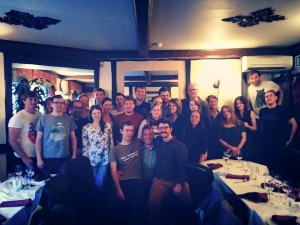 James Hickey recently completed his PhD in the School of Earth Sciences. His research focused on unravelling the mechanisms that cause volcanoes to become restless prior to eruptions. Ultimately, the aim is to improve our understanding of precursory signals to enhance forecasting and mitigation efforts.
James Hickey recently completed his PhD in the School of Earth Sciences. His research focused on unravelling the mechanisms that cause volcanoes to become restless prior to eruptions. Ultimately, the aim is to improve our understanding of precursory signals to enhance forecasting and mitigation efforts.
It’s been a long and winding road, but I’ve reached the final hurdle – minor post-viva corrections. So while everything is still fresh (or permanently etched into my mind!) I thought I would share some of my thoughts on the thesis write-up and viva process.
I didn’t have a long write-up period at the end of my studies – I started writing in my first year, and continued to write throughout in the form of a series of papers. I think this helped keep me slightly saner at the end of the 3.5 years, but don’t get me wrong; the last few months still weren’t easy!
My supervisor was very proactive from the start at getting me to think of my work in terms of publications, and this soon bore fruition. I managed to publish 3 papers before I started writing my thesis proper, with my fourth and final science chapter/study now currently in prep for publication.
When it came to the piecing together of my actual thesis I made sure I was being as efficient as possible with my time. As I still had a few models to run for my final science chapter, I used this time to simultaneously start formatting my thesis. I used LaTeX for this, which has numerous advantages over something like Microsoft Word – this could be a blog post in itself, so I won’t go into it here. But if you are thinking of using LaTeX I’ve made my thesis template freely available online, and it meets all of the University of Bristol rules and regulations (as far as I’m aware).
In the end, my thesis consisted of three science chapters from my papers, plus one additional science chapter. To me, I think this is roughly where the end line should be drawn. I feel like the additional chapters (introduction, methods, conclusions, etc.) are mostly unnecessary. Each science chapter usually has its own introductions, methods, and conclusions – so why the need to repeat? At the end of the day, maybe 5 people maximum are going to read the full thesis (the student, maybe two supervisors, and two examiners), while (hopefully) many more people will read the science chapters when they’re published. I feel it would make much more sense to be able to simply submit 3 or 4 solid science chapters, with maybe a couple pages each for some pre- and post-amble that ties things together in view of an overall bigger picture. No waffle – just good, original, science. (N.B. I can’t speak for the process in faculties other than science, where concepts, logistics and PhD theses may be vastly different.)
My viva came a month and a half after my thesis hand-in. A few days before I got ‘the fear’ – something I’ve not felt since I sat my (somewhat underprepared) undergraduate exams. I had spent most of my time trying to write a paper that my viva crept up on me, leaving me with just two days either side of a wedding weekend to ‘prepare’. Naturally I googled ‘viva prep’, which mostly suggested a week or so of going through potential questions and preparing answers. I instead used my time to read through my entire thesis, and think about it in a critical way; assessing where it could be improved and how it fits into the broader scientific picture I was addressing.
Going into my viva I was hoping that the 3 published papers in my thesis would be mostly free from the examiners onslaught. I was wrong.
My two examiners went through my thesis from cover to cover and picked everything apart: “why did you do this?”, “why did you choose this value?”, “why didn’t you do this?”, “I don’t really like this”, “you could have done this”, “why didn’t you do this?” (again). It’s like they don’t know that we’re mostly scrambling to get the thesis finished in as close to the 3 or 3.5 years of funding we are afforded (with 4 being more like the normal PhD timeframe in my department these days). I know some people say they enjoy their viva, but I was unfortunately not one of them – 2.5 hours with next to no positive comments for the amount of work put in was somewhat demoralising (and also slightly off-putting of a future career in academia).
I did stand my ground, however. On more than one occasion I even had to interrupt the examiners and ask to speak as I had the rebuttal on the tip of my tongue but was struggling to squeeze a word in. In other cases, it was only after my viva that I thought of the most scientifically appropriate comeback. You win some, you lose some. I guess it is a defence of your work at the end of the day…

I eventually emerged victorious (yay!), to bountiful cheese, wine, olives and Jagermeister – subject to minor revisions that is. If only the post-viva period was like a paper review and I could write back with my rebuttal arguments for the points where I couldn’t think of them during the viva. Oh well. I was also asked to lengthen my conclusions and methods chapters (boo!). I still don’t understand why, and I probably never will, especially as only the internal examiner and myself will ever see them.
Regardless, I’ll look back on my PhD journey as a positive one. I have improved myself in many ways, met some amazing people, and travelled to some incredible places. I will also be able to address myself as Dr if I so please.
To anyone nearing the end – hang in there. It may not seem like it right now, but it will all be worth it.


